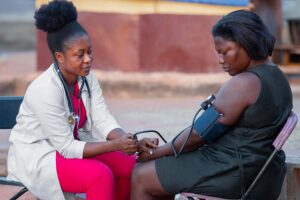Every drop of blood donated has the power to save lives. In Nigeria, where blood shortages are a growing concern, your simple act of giving blood can mean the difference between life and death for someone in need. But have you ever stopped to think about the profound impact that blood donation can have on individuals, families, and entire communities? Blood donation is not just an act of kindness; it is a lifeline, a crucial service that can change lives in moments of dire need.
The Need for Blood in Nigeria
Nigeria, like many other countries, faces significant challenges when it comes to the availability of blood. Whether due to accidents, childbirth complications, or chronic conditions, the demand for blood is always high. Unfortunately, blood donation rates are often lower than required. A study from the World Health Organization revealed that only 10% of Nigerians regularly donate blood, far below the recommended target. This makes it even more critical for people to recognize the importance of blood donation and make it part of their routine healthcare actions.
Understanding Blood Donation and Its Importance
Blood donation is a voluntary act of giving your blood for medical purposes, typically to a blood bank or plasma center. There are different types of blood donations, including whole blood donation, platelet donation, plasma donation, and stem cell donation. Each type plays a unique role in saving lives. For instance, donating plasma can help treat burn victims, those with clotting disorders, or patients undergoing surgery. Platelet donation is essential for cancer patients, while bone marrow and stem cell donations help treat conditions like leukemia.
In Nigeria, one organization leading the charge in ensuring the availability of blood and plasma is Oneus. With its well-established plasma donation centers, Oneus is providing people with the resources to save lives. Their network ensures a seamless process for those willing to donate blood or plasma, offering an efficient and safe environment for donors.
How Blood Donation Saves Lives: Key Facts
Blood transfusions are a critical part of medical treatments. Blood is used in surgeries, trauma care, cancer treatments, childbirth complications, and to support patients with anemia or severe blood loss. For patients with rare blood types or specific genetic factors such as the rhesus factor or genotype, finding a compatible blood donor becomes a matter of life and death. That’s why it is so important for everyone, regardless of blood group (whether O positive, A negative, or others), to consider donating.
Oneus’s plasma centers also provide services like plasma donation, which is particularly valuable for treating patients who need blood plasma or clotting factors. Plasma donations help treat burns, trauma injuries, and clotting disorders, ensuring that those in need receive the best possible care.
Risks of Not Donating Blood: A Growing Crisis
When people hesitate to donate blood, the consequences can be severe. A shortage of blood leads to delayed treatments, unnecessary deaths, and immense suffering. Many patients depend on the availability of blood from donors to stay alive. Furthermore, conditions like blood cord banking and umbilical cord blood banking are crucial for stem cell and bone marrow transplant patients. Without a constant supply of donated blood and plasma, these medical services can be delayed, affecting many lives.
By regularly donating blood, you can avoid this growing crisis. It’s a small act that can create a big impact. Blood donation websites, such as the one offered by Oneus, provide an easy way to get involved in blood drives and locate donation centers, making it simple to take action.
The Process of Giving Blood: What You Need to Know
Donating blood is simple, safe, and incredibly rewarding. Here’s a step-by-step guide to what you can expect:
-
Pre-Donation Screening: You will be asked to complete a health questionnaire. This ensures that you are eligible to donate blood and that it is safe for you to do so.
-
Blood Donation: The process typically takes about 10-15 minutes. A trained healthcare professional will take blood from your arm, and you will rest for a few minutes afterward.
-
Post-Donation Care: After the donation, you can enjoy a snack and drink water to replenish your fluids.
-
Next Steps: Your blood is processed, tested, and stored in a blood bank. It is then ready to be used in hospitals or clinics when needed.
It’s also worth noting that if you are considering donating plasma, the process may take a bit longer, but the positive impact is just as significant.
Why You Should Donate Blood Today
Blood donation is a straightforward way to make a difference. Your donation could save the life of a mother during childbirth, help a child with leukemia, or provide a burn victim with the plasma they need to heal. As the demand for blood grows, your act of giving could mean someone else’s survival.
Moreover, regular donors can support others by donating their bone marrow or even stem cells, which are essential for many medical conditions. So why wait? Give blood, save a life, and take action today.
Call to Action: Book Your Donation Now!
The need for blood and plasma donations in Nigeria is real. Oneus is leading the way in ensuring the availability of these life-saving resources. Book your blood or plasma donation today by visiting www.oneusng.com or contacting us at info@oneusng.com or +234 902 168 2822.
Your blood can make a world of difference. Don’t wait—give blood, save a life.




